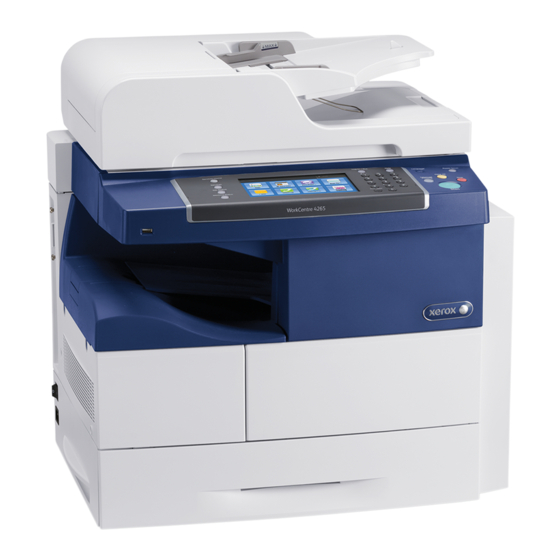A Standard ODIO will overwrite all image data except data stored by the Reprint Save Job feature and data stored in
Embedded Fax dial directories and mailboxes; a Full ODIO will overwrite all image data including data stored by the
Reprint Save Job feature and data stored in Embedded Fax dial directories and mailboxes.
Immediate Image Overwrite of a delayed or secure print job will not occur until after the machine has printed the job.
If an Immediate Image Overwrite fails, an error message will appear at the top of the screen indicating that there is an
Immediate Image Overwrite error and that an On Demand Image Overwrite should be run. This error message will
persist until an On Demand Image overwrite is initiated by the System Administrator.
If there is a power failure or system crash while a network scan job is being processed, an IIO of the residual data will
occur upon job recovery.
If there is a power failure or system crash of the network controller while processing a print job, residual data might still
reside on the hard disk drive(s). Immediately invoke a full ODIO once the machine has been restored.
Once a manual or scheduled ODIO has been initiated it cannot be aborted.
Before invoking an ODIO verify that:
There are no active or pending print or scan jobs.
There are no new or unaccounted for Dynamic Loadable Modules (DLMs) or other software running on the
machine.
There are no active processes that access the hard disk drive.
No user is logged into a session via network accounting, Xerox Standard Accounting, or the internal auditron, or
into a session accessing a directory on the hard disk drive.
After a power on of the machine all subsystems must be properly synced and, if printing of Configuration Reports is
enabled on the device, the Configuration Report must have printed.
For any previously initiated ODIO request the confirmation sheet must have printed.
When invoked from the Web UI the status of the completed ODIO may not appear on the Web UI but can be
ascertained from the Confirmation Report that is printed after the Network Controller reboots.
If there is a failure in the hard disk drive a message recommending that an ODIO be run will appear on the Control
Panel. An Immediate Image Overwrite Error Sheet will also be printed but may contain incomplete status information.
Immediately perform the requested ODIO.
If an ODIO is successfully completed, the completion (finish) time shown on the printed On Demand Overwrite
Confirmation Report will be the time that the system shuts down.
If an On Demand Image Overwrite fails to complete because of an error or system crash, Xerox recommends that
another On Demand Image Overwrite be immediately perform, but only after completion of a system reboot.
Perform a Full ODIO immediately before the device is decommissioned, returned, sold or disposed of.
f.
The device supports the use of SSLv2.0, SSLv3.0, RC4 and MD5. However, customers are advised to set the crypto policy of
their clients to request TLSv1.0 (SSLv3 should be disabled) and to disallow the use of RC4 and MD5. Security functions in the
evaluated configuration make use of cryptographic ciphers listed in Table 22 of the Security Target. The cryptographic
module supports additional ciphers that may be called by other unevaluated functions.
Using the device in FIPS mode will automatically restrict the device to using TLSv1 only.
g.
When utilizing Secure Sockets Layer (SSL) for secure scanning:
SSL should be enabled and used for secure transmission of scan jobs.
When storing scanned images to a remote repository using an https: connection, a Trusted Certificate Authority
certificate should be uploaded to the device so the device can verify the certificate provided by the remote repository.
When an SSL certificate for a remote SSL repository fails its validation checks the associated scan job will be deleted
and not transferred to the remote SSL repository. In this case the job status reported in the Completed Job Log for this
job will read: "Job could not be sent as a connection to the server could not be established".
The HTTPS protocol should be used to send scan jobs to a remote IT product.
h.
Audit Log Notes:
In viewing the Audit Log the System Administrator should note the following:
Deletion of a file from Reprint Saved Job folders or deletion of a Reprint Saved Job folder itself is recorded in the
Audit Log.
Deletion of a print or scan job or deletion of a scan-to-mailbox job from its scan-to-mailbox folder may not be
recorded in the Audit Log.
7

